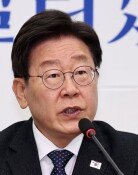Inevitability in intelligence sharing over N. Korean threats
Inevitability in intelligence sharing over N. Korean threats
Posted December. 27, 2014 01:48,
South Korea, the United States and Japan will sign a memorandum of understanding Monday on sharing their military intelligence about North Koreas nuclear and missile threats. At a time when the Norths military brinkmanship is becoming the biggest security threat in Northeast Asia, there is a realistic need for the three allies to restore and strengthen their security cooperation.
It would be wise to separate national security from history issues to jointly cope with common threats. Equipped with surveillance satellites, strategic patrol aircrafts and Aegis destroyers capable of precisely tracking movements at North Koreas nuclear test sites, missile bases and transporter erector launchers, Japan is partly ahead of South Korea in capabilities for conducting surveillance on the North. If the sharing of Japans intelligence with South Korea and the United States would reduce blind spots in surveillance over North Korea, making it easier for them to immediately react to the situation in the event of an emergency.
The three allies agreed on the need for such a pact at a defense ministers meeting in Singapore in May. Seouls defense ministry believes that real-time sharing of top-class intelligence gathered by Washington and Tokyo could improve the ministrys capabilities for surveillance over Pyongyangs nuclear weapons and missiles at least five times. Despite the significant security benefits of the intelligence sharing, Seoul chose to sign a memorandum of understanding instead of a formal treaty because it was conscious of the stir created by the Seoul-Tokyo intelligence protection agreement in 2012. At that time, the Lee Myung-bak administration passed the pact calling for comprehensive intelligence sharing with Japan at a Cabinet meeting behind closed doors. Faced with strong public outcry over the secrecy in the sensitive issue, the Lee administration unilaterally informed Japan of its plan to postpone the pact just before a signing ceremony. Kim Tae-hyo, a key official at the presidential office Cheong Wa Dae for external strategies, resigned over the scandal. In South Korea, military cooperation with Japan, a former colonial ruler of Korea, is a sensitive issue. It is possible that this time, too, critics will raise concern about paving the way for Japanese Prime Minister Shinzo Abes moves to exercise his countrys collective self-defense rights. Nevertheless, the South Korean government should convince the public about the security situation on the Korean Peninsula that makes it inevitable to share intelligence with Japan.
It is highly likely that China will protest the three-nation pact, considering Beijings warning that the deployment of the terminal high-altitude area defense missile system (THAAD) in South Korea would seriously damage the Seoul-Beijing ties. As China must be well aware of the Norths nuclear and missile threats, however, Seoul should explain its case to Beijing and ask for its understanding in a dignified manner. Over the eight years since the Norths first nuclear test in October 2006, Pyongyang has significantly secured capabilities for making small nuclear warheads and striking the mainland U.S. It is natural for the three allies to take self-defensive measures. It is a matter of sovereignty in which no other country can intervene.







